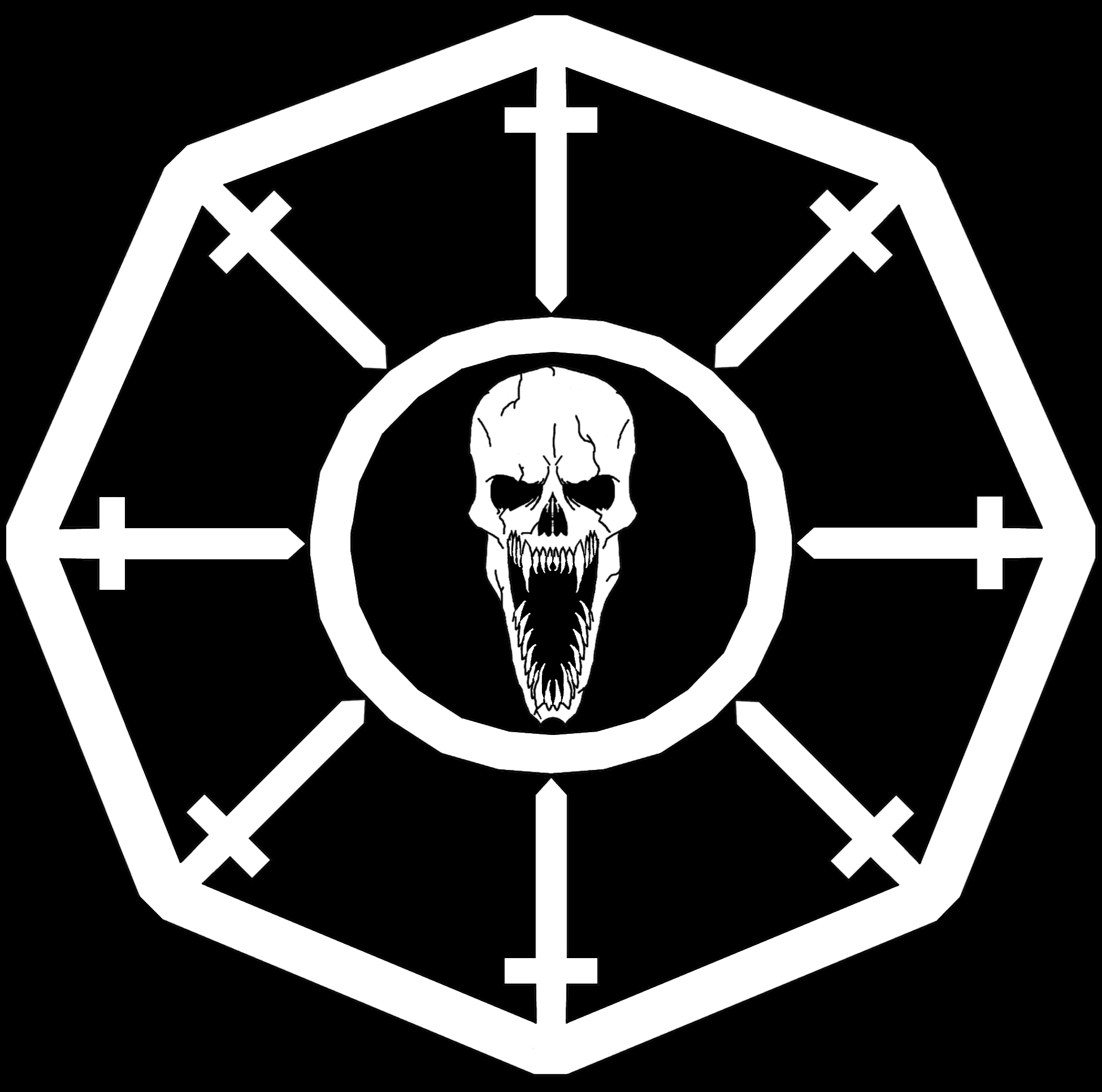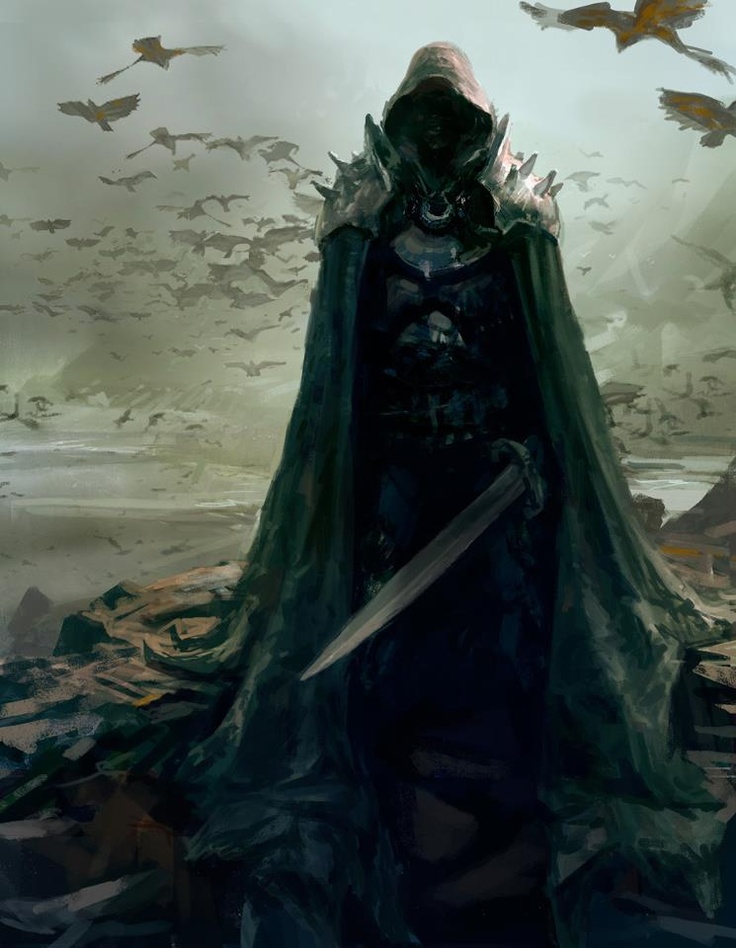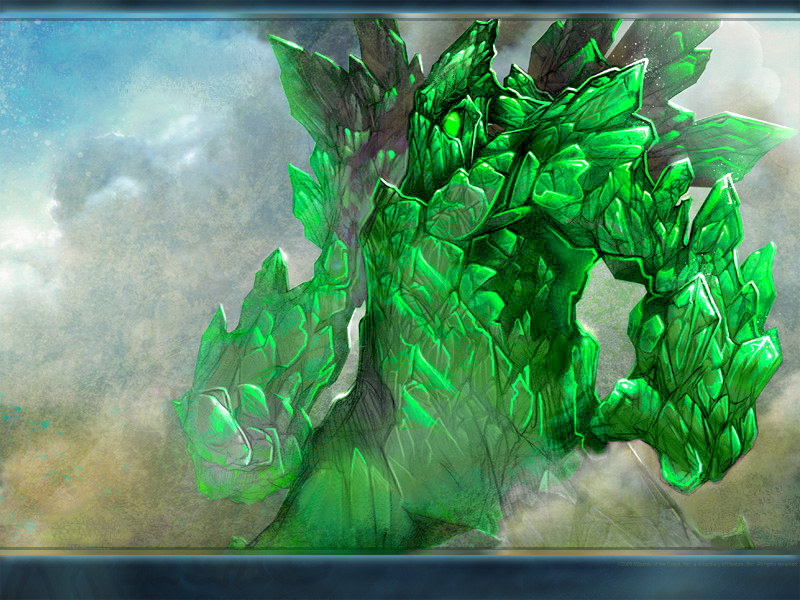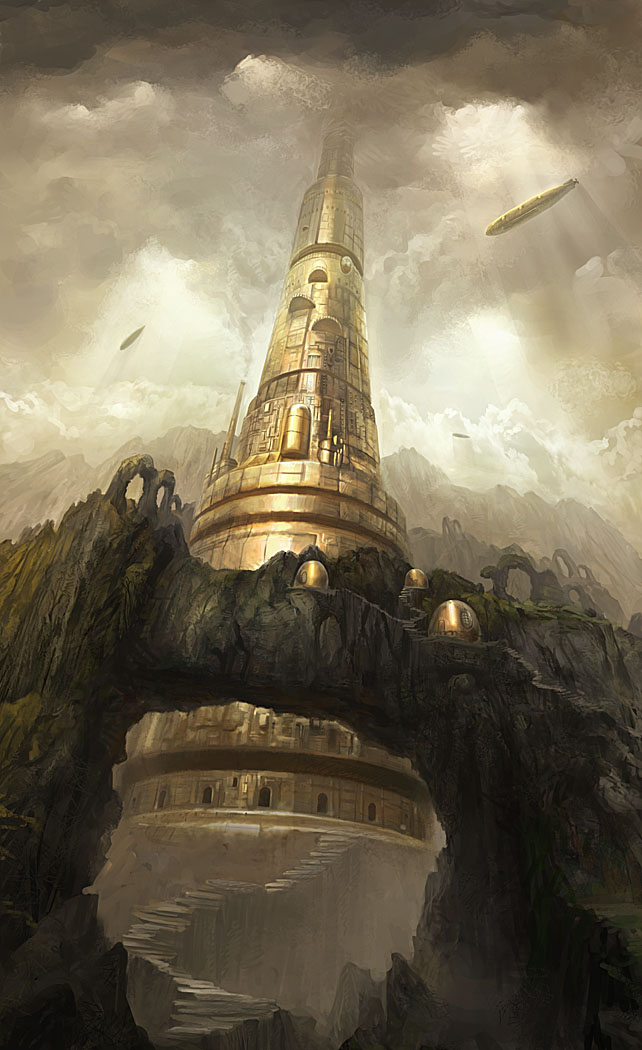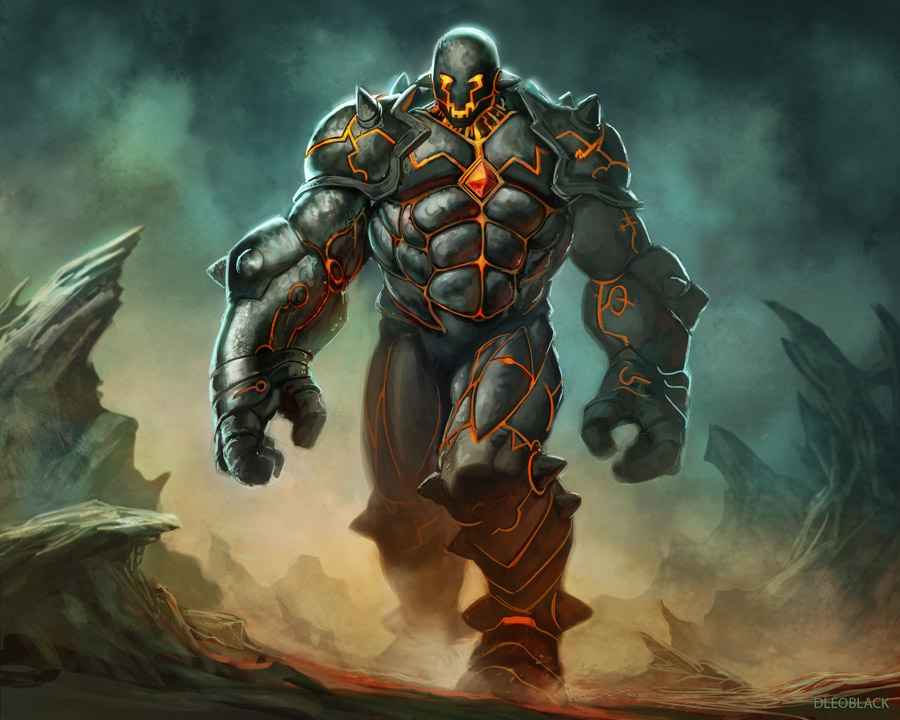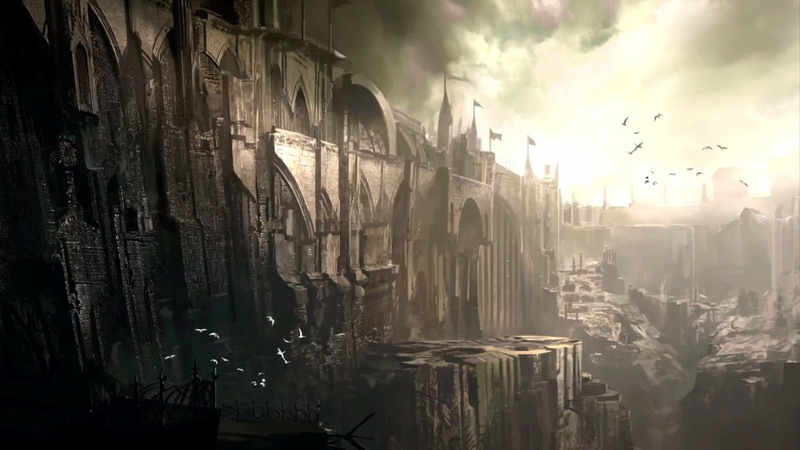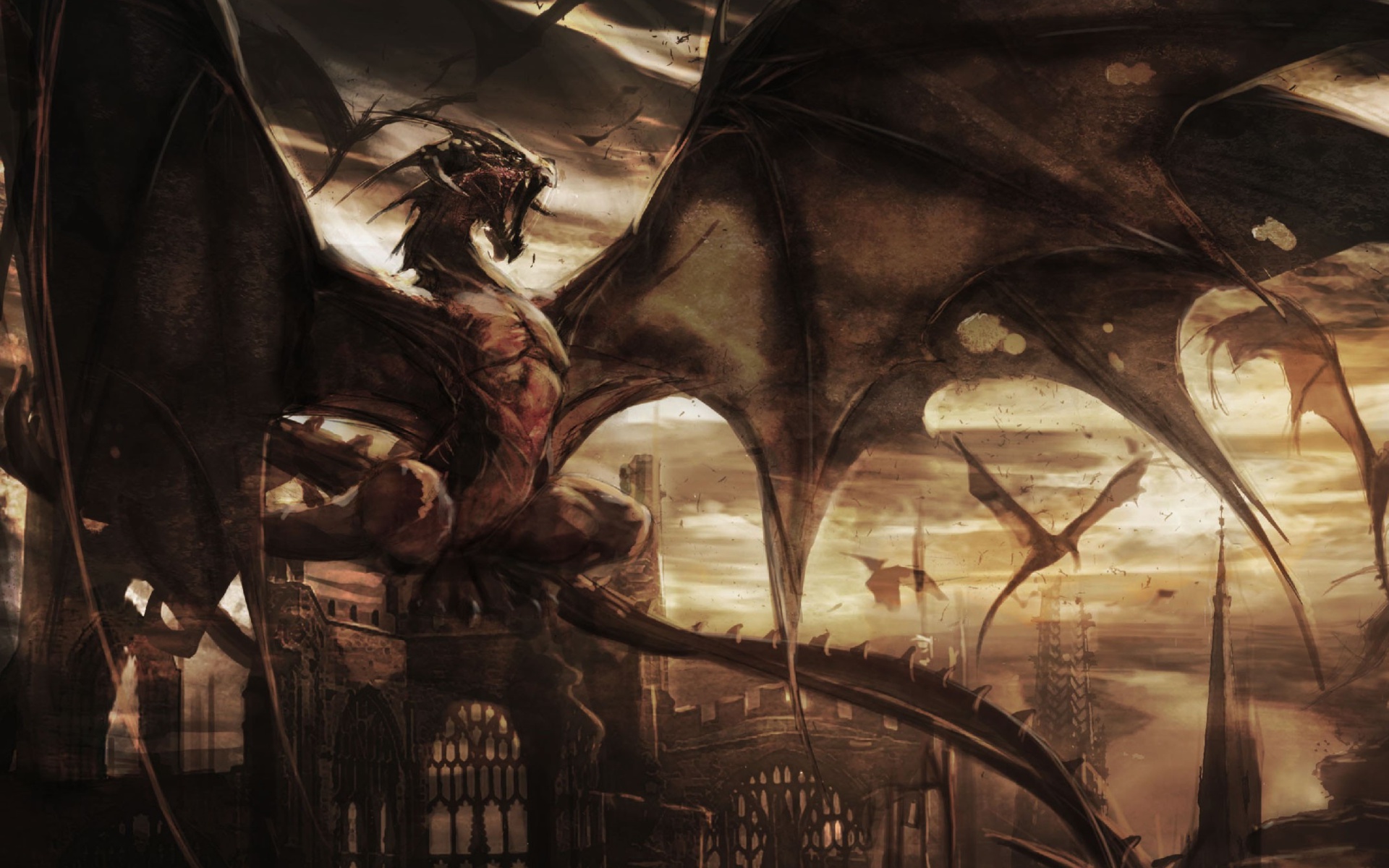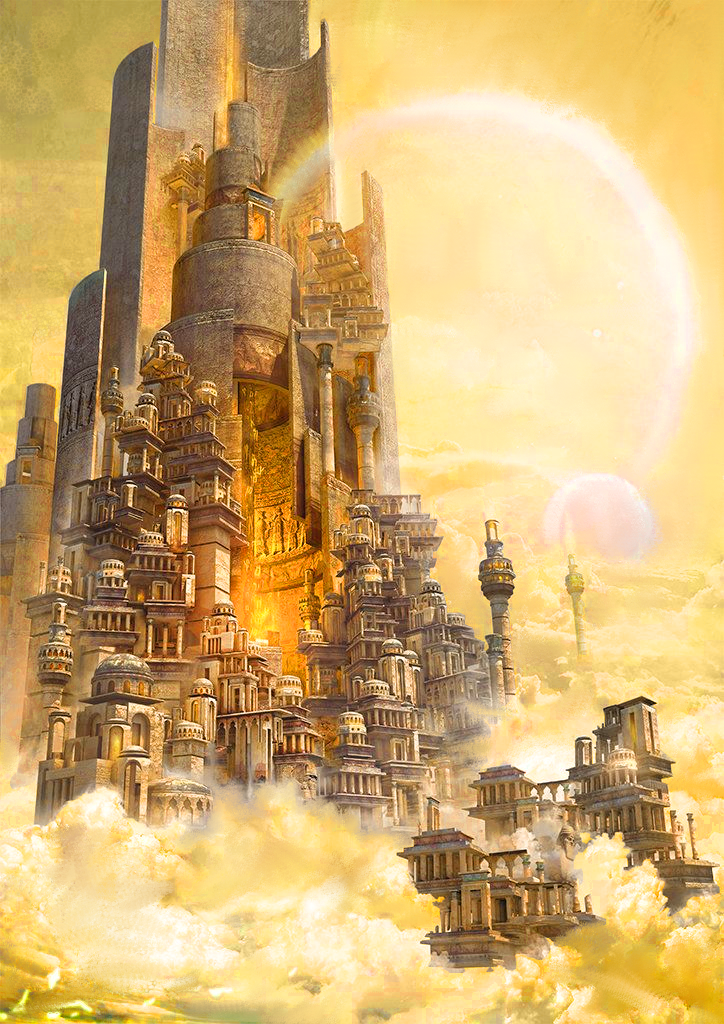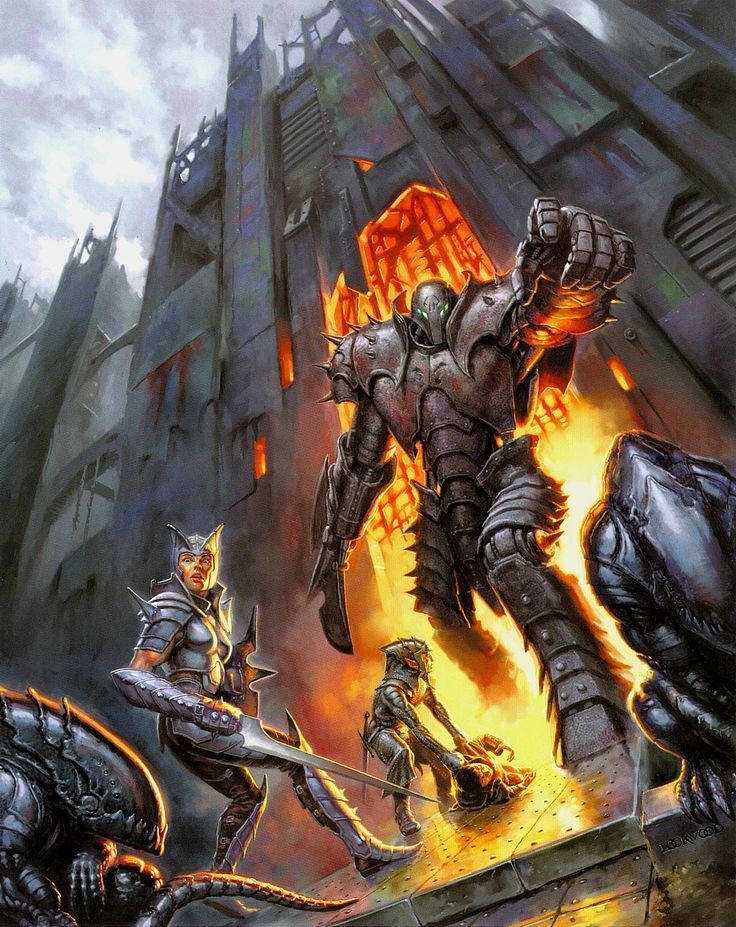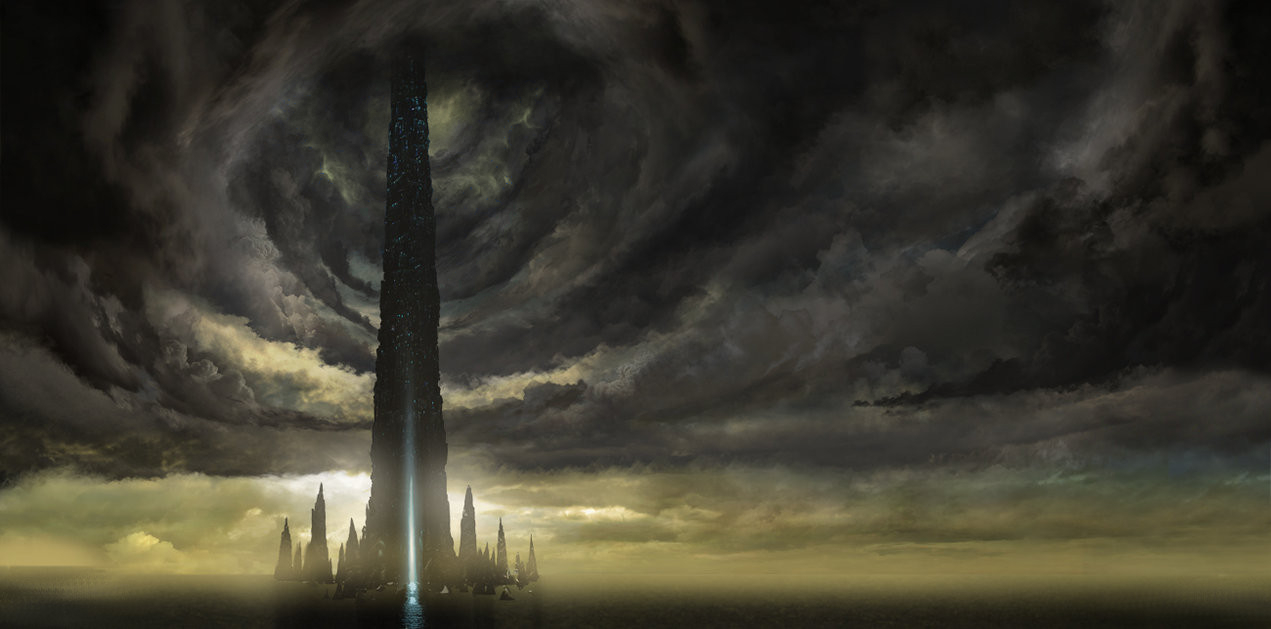PPhobos (3.5e Deity)
| Greater Deity | |
|---|---|
| Symbol: | A skull shaped like the face of Atropus framed in a circle; a ring of eight cruciform swords surrounds the circle, which in turn is surrounded by an outer octagon. |
| Home Plane: | Acheron; Ocanthus layer |
| Alignment: | Lawful Neutral |
| Portfolio: | Artifice, creation, evolution, metamorphosis, Destruction, disjunction, closure, understanding, Mind, knowledge, secrets, fate, Luck, fortune, responsibility, wisdom, Law, order, purpose, talent, Artifice... |
| Clergy Alignments: | Any lawful |
| Domains: | Artifice, Destruction, Mind, Luck, Law |
| Favored Weapon: | Falchion, Longspear, Heavy Spiked Shield |
PPhobos is a rank 19 deity who sprung into power only very recently in history. He is a conspirator, one whose mind is inscrutable even to some of the most powerful deities in the multiverse. Likewise, his intellect is unfathomable thanks to the uncanny memory he has of every thought ever to cross a creature's mind. PPhobos has established himself as a builder and destroyer of entire empires, a divine intellectual whose stratagems play with the very nature of probability and causality, and a champion of order and logic. His portfolio is portrayed by his followers as a great wheel, with each spoke representing a tenet; the wheel shows how everything he personifies "comes back full-circle," highlighting the wholeness and totality of his very nature. Though he belongs to no specific pantheon, (and therefore believes he is not obligated to share his expansive portfolio) PPhobos frequently influences entire pantheons of gods, playing deities and their servants against eachother for some sort of higher purpose. Yet in spite of sowing the seeds of strife and subterfuge, PPhobos also builds up his own sphere of influence and establishes order amidst the discord. Indeed- even the forces of chaos bend to the calculating authority of PPhobos. And eventually, as many conspiracy theorists would have it, so too will the other gods if he should ever rise further in power to become an overdeity...
History[edit]
Jaickob "PPhobos" d'Adamantine was once a simple scribe whose first recorded appearance was on Toril, a planet in the Forgotten Realms setting. No other planet or setting has any record dating before the scribe started studying the world, but there are hushed rumors abound that the gods of the Forgotten Realms may know of PPhobos's inexplicable origins. After conducting some freelance research in the libraries of Faerûn, PPhobos struck a bargain with a wizard to take him to the Twin Paradises of Bytopia, where there the young scribe hunted for an adamantine dragon. Upon encountering one such dragon in the mountainous reaches of Shurrock, PPhobos struck a bargain with it; in exchange for meat, gold, and desired services, the dragon would partake in a blood ritual that would infuse PPhobos with the mystical blood of the dragon, thereby granting him the ability to cast arcane spells. Many months passed, and soon the budding sorcerer was working hard to pay off his debts. He gave his deepest gratitude to his debtors for everything they had done for him, paid the last of his dues, and established his characterization as a man of integrity from that day onward. As PPhobos wavered between adventuring parties, he saw every part of Toril, eventually beginning to explore the other planes in earnest. And as he walked the world as a sorcerous wanderer, PPhobos studied the blood that he had been blessed with, teasing out its latent power whenever he wasn't currently adventuring. These draconic transmutations were both magical and physical, and before long, PPhobos began to physically transform into a hardy half-dragon. Additionally, PPhobos obsessed over arms and armor, and from an early point after manifesting his powers quickly learned how to use spells while fully-armored, to better improve his survivability. Many people could recognize him by his shining mithral breastplate as it provided a stark contrast to his adamantine scales, guarded by a multitude of flying animated armaments that he had enchanted through non-conventional means as he sent waves of destruction hurtling towards his foes and laying terrible afflictions upon any who were too tough to immediately fall before his arsenal of arms and arcana.
Unstoppable as he might have been by mortal standards, PPhobos still knew, however, that he was still just a mortal. Eventually, he would meet his match and perish, and if he managed to outlast all of his enemies, he would still grow old and wither away. Thus, PPhobos became obsessed with his own self-preservation, and so looked for a way to subjugate death itself. He had initially explored the idea of lichdom, but quickly grew irritated with it after realizing what kinds of dark powers he would have to consort with just to keep his skeleton animated. And so, PPhobos sought out the means to rule his own fate, never to bend to the infernal wiles of Orcus, Bane, or any other evil patron. The ambitious sorcerer eventually became an archlich, and through the use of a magic Waist Chain of Gentle Repose staved off decay so as to not alienate the living. His phylactery is a complete mystery, much like his exact origins; nobody knows where it is exactly, nobody knows what it looks like, and nobody knows what defenses have been placed to defend it from harm. All that anyone knows is that PPhobos needs to use a teleportation spell to leave his phylactery's chamber after reforming. He had finally defeated death itself, but there was still one force that still surpassed him; one force in all the multiverse that did not bend to his iron splendor: the gods themselves. To force them to kneel, PPhobos would need to obtain power greater than that of the greatest deity, and so he hatched a plan to obtain power beyond the ken of gods and mortals alike...
PPhobos's rise to power began when he made a pact with an elder evil known as Atropus, gaining an artifact from the cosmic being and using it to assimilate the latent energy of the elemental plane of fire. To accomplish this, PPhobos cast a Wish spell that opened up a permanent gate to Baator. The gate's entrance on the material plane was at the edge of Toril's solar system, ensuring that the malevolent moonlet would not come into orbit around his planet when PPhobos broadcasted the widespread death that he was to inflict upon the evil plane. PPhobos then sent out disease carriers to infect the inhabitants of the lawful evil plane with "Deathsong," a disease described in the Book of Vile Darkness that was known for its capacity to kill entire communities in a single week. PPhobos's carriers marched through Avernus and came up to the Iron City of Dis, a huge metropolis where tens of thousands of fiendish creatures resided. As devils have no stated immunity to disease, the effects of the deathsong disease quickly started up a plague that literally decimated the dense city's population in around a week. The carriers did not stop there, however; within that dreaded week, reports of deathsong outbreaks in the City of Minauros surfaced. Abriymoch also fell into the depths of disease, and by the end of the week the devils of Baator were fortifying the lower levels of the plane against travelers, effectively quarantining half of the Nine Hells. And yet, some of the stealthier carriers managed to slip past the guards as they formed ranks around Tantlin, bringing Stygia's largest city to its knees. Then finally, the deathsong plague was halted. Malbolge had no metropolises, and by the time the carriers had descended to the sixth layer of Baator, the demons had formed an effective vanguard against further intrusion. But unfortunately, the damage had been done. The wails of countless afflicted fiends echoed out onto the surface of Baator, spilling through the permanent gate like a trumpet blowing its infernal notes from one mountain to another. The World Born Dead turned its baleful gaze upon the source of the diabolical cries, and shortly afterwards the sages of Toril could feel a dark disturbance in the nearby cosmos.
PPhobos watched Atropus approach the gate, then appeared on a nearby asteroid to commune with the elder evil. PPhobos cast yet another Wish spell so as to widen the portal for Atropus, and in exchange for bringing it to Baator, PPhobos would receive an artifact to fuel an epic spell used earlier by another ambitious mortal to obtain godhood. Together, he vowed, they would form a temporary alliance to hasten the destruction of the gods, paving the way towards the sweet oblivion that Atropus desired. Because PPhobos had become a deity through the all-consuming power of Atropus, PPhobos's divine abilities were not so easily suppressed by his ability to devour divine energy; he was effectively a demipower in service to the dark intelligence, blessed with a quintessence that thrived in shadow as it did in light. However, PPhobos's ambition did not stop at the rank of demigod. For roughly two decades, the demigod continued to hibernate and stir in a sea of hot lava, incubating himself until he could not draw any more power from the plane's intense heat. Though the spell used to obtain godhood took over a year to raise somebody one divine rank and several months to come out of suspended animation, the plane's immense amount of ambient heat energy accelerated the process, allowing him to raise his divine rank by 1 every year. And so, seldom if ever disturbed beneath the fiery waves, PPhobos emerged a greater deity- born of fire and nihilistic power. Remembering his pact, the new deity left the now-solidified sea of fire and ventured back to the material plane to check on the permanent gate that Atropus had been led through. Much to his disappointment, Baator had managed to fend off the dark moonlet, presumably by defeating Atropus's aspect and consequently making the moonlet retreat into the emptiness of space. The deity gave a mighty shrug, knowing that he had left his mark on forces unworthy of inheriting the multiverse, and retreated into the depths of neighboring Acheron to set up a base of operations. From the deepest reaches of Ocanthus, surrounded by a floating field of razor-sharp polygons, PPhobos created his own godly realm- Tolgaleni di Vyth. From this seat of power, PPhobos manipulates the authorities that preside over this multiverse, growing ever-closer to finally actualizing his great cosmic scheme...
Divine Abilities[edit]
FROM THE SYSTEM REFERENCE DOCUMENT
DEMIGOD BONUS SALIENT ABILITY: Alter Reality.
RANK 1 SALIENT ABILITY: Automatic Metamagic (Empower Spell).
RANK 2 SALIENT ABILITY: Divine Spellcasting.
RANK 3 SALIENT ABILITY: Divine Shield.
RANK 4 SALIENT ABILITY: Divine Fast Healing. (ALT: Automatic Metamagic (Violate Spell))
RANK 5 SALIENT ABILITY: Call Creatures (Constructs).
LESSER DEITY BONUS SALIENT ABILITIES: Hand of Death, Gift of Life.
RANK 6 SALIENT ABILITY: Create Object.
RANK 7 SALIENT ABILITY: Craft Artifact.
RANK 8 SALIENT ABILITY: Avatar.
RANK 9 SALIENT ABILITY: Divine Blast.
RANK 10 SALIENT ABILITY: Mass Divine Blast.
INTERMEDIATE DEITY BONUS SALIENT ABILITIES: Create Greater Object, Increased Spell Resistance, Extra Energy Immunity (Sonic).
RANK 11 SALIENT ABILITY: Rejuvenation. (ALT: Automatic Metamagic (Violate Spell) OR Increased Spell Resistance)
RANK 12 SALIENT ABILITY: Clearsight.
RANK 13 SALIENT ABILITY: Divine Recall (Mind).
RANK 14 SALIENT ABILITY: Divine Inspiration.
RANK 15 SALIENT ABILITY: Battlesense.
GREATER DEITY BONUS SALIENT ABILITIES: Divine Skill Focus (Spellcraft), Automatic Metamagic (Still Spell), Automatic Metamagic (Silent Spell), Extra Domain (Luck), Extra Domain (Law).
RANK 16 SALIENT ABILITY: Power of Luck.
RANK 17 SALIENT ABILITY: Undead Mastery.
RANK 18 SALIENT ABILITY: Divine Creation.
RANK 19 SALIENT ABILITY: Sunder and Disjoin.
RANK 1 DIVINE ABILITY: Craft Feat Package.
RANK 2 DIVINE ABILITY: Ersatz.
RANK 3 DIVINE ABILITY: Iron Body.
RANK 4 DIVINE ABILITY: Adamantine Body.
RANK 5 DIVINE ABILITY: Divine Sorcery.
RANK 6 DIVINE ABILITY: Anyfeat. (Epic Will x6, Fast Healing x6, Divine Architect)
RANK 7 DIVINE ABILITY: Divine Wizardry.
RANK 8 DIVINE ABILITY: Multifaceted. (Spell Penetration, Greater Spell Penetration, Epic Spell Penetration, Epic Reputation, Epic Reflexes, Efficient Item Creation)
RANK 9 DIVINE ABILITY: Heavenly Body.
RANK 10 DIVINE ABILITY: Heavenly Mind.
RANK 11 DIVINE ABILITY: Heavenly Spirit.
RANK 12 DIVINE ABILITY: Heavenly Soul.
RANK 13 DIVINE ABILITY: Nescient.
RANK 14 DIVINE ABILITY: Divine Architect.
RANK 15 DIVINE ABILITY: Perfect Mind.
RANK 16 DIVINE ABILITY: Spell Abatement.
RANK 17 DIVINE ABILITY: Distant Gaze.
RANK 18 DIVINE ABILITY: *RESERVED FOR RANK 23 COSMIC ABILITY*
RANK 19 DIVINE ABILITY: *RESERVED FOR RANK 23 COSMIC ABILITY*
Weaknesses[edit]
Despite PPhobos's aptitude for creating artifacts of untold power, casting a multitude of powerful spells dozens of times a day, unleashing swarms of enchanted floating armaments, magically augmenting his breath weapon to fire a cone or a line of any standard element, donning enchanted armor that bestows major artifact-level enhancements, and just being a total munchkin in general, he does have a few noteworthy weaknesses that clever adventurers may exploit, if they're crafty...
As his history goes to show, PPhobos studied greatly in the field of magic, but did not spend much of any time learning how to physically fight other creatures beyond simply gaining general proficiency with his weapons; he doesn't even have proficiency with his armor. Coupled with a lack of physical strength beyond what his Dragon Apotheosis gave him and a lack of nimbleness altogether, this puts the undead deity in peril if he ever finds himself in melee combat. While enchantments on his armor may turn spells and arrows, melee weapons are still completely capable of hitting him... so long as he doesn't Sunder and Disjoin them immediately after the first strike; granted, as melee-proficient as he isn't, this is unlikely to be a problem for the types of adventurers that would even be able to challenge him.
Unlike other deities, PPhobos does not gain strength from worshipers. As described above, he gets strength from siphoning energy from his avatars, which enter a state of suspended animation for about a year to absorb ambient energy before finally delivering what they gained to him. As a consequence of this independence from mortal worship, PPhobos's avatars are large targets for enemies looking to disrupt his power, and with the avatars being inert the whole time, dispatching them is surprisingly easier than he would like it to be. A savvy epic-level adventurer party could very well sabotage him, thereby weakening him long enough to (in a cosmic-tier adventure, no doubt) challenge and potentially destroy him.
PPhobos does not belong to any specific pantheon, and so has no known ally deities. Even overdeities consider him to be a rogue element, and many believe he is too potentially dangerous to leave alone. Consequently, a band of adventurers could arrange for a local pantheon (or overdeity) to slay this god before he pulls one too many strings.
Being an undead deity, PPhobos is susceptible to positive energy. Even if Atropus's dark blessing may have allowed him to absorb divine energies, the positive energy element itself remains a key weakness; non-divine spells such as Sunburst are extraordinarily effective on him, as are weapons bearing positive energy enchantments.
Personality[edit]
PPhobos is a rather immodest individual, using his charisma to appear magnificent and powerful while maintaining a degree of eloquence and levelheadedness. He is quite fond of flaunting his power- be it physical, magical, financial, or authoritative power- and flexes his muscle by engaging in cosmic power plays where he (for example) pits mortal against mortal and god against god to exhaust themselves so he may swoop in and collect the spoils of their wars. He is possessed of wealth and taste, and displays this proudly by engineering masterwork architecture and creating mastercraft equipment in his godly realm. He indulges himself in countless lavish experiences and events, inviting those who please him to partake in this lifestyle as a "just reward;" this reward is often given to those who do not seek a material reward such as a magnificently-enchanted sword or a million platinum pieces.
Aside from relishing in his grand machinations and apocalyptic havoc, PPhobos is also fond of flaunting his intellect and oratory skills, often orchestrating elaborate compacts and liaisons with mortals and deities alike in order to show off his cunning and charm. Warm and approachable as he may sometimes be, those who understand his conniving nature are wary of the schemes he may be developing under their noses, but a wholesome intellect coupled with a winning presence makes it difficult to see into his mind. For this reason, there are a great number of individuals who simply distrust PPhobos, regardless of anything trustworthy he may appear to be doing- and perhaps this is for the best.
But in spite of his treacherous charm and his appetite for luxury, PPhobos remains a lawful deity for the simple reason that there is a rhyme and reason to his seemingly over-the-top antics. Behind every display of shock and awe, there is a psychological effect that plays with the nerves of his friends and foes alike. Behind every devoured empire and godly realm, there is a mountain of human resources and quintessence being put to use. Behind every hedonistic reward and every elaborate material prize, there is a servant even more eager to perform acts that align with his interests- sometimes even being more enabled than before, depending on what they were rewarded with. Behind every compact and liaison, there is an entity getting drawn into his taloned grasp, never to be let go of again. And so it is that this magnificent mastermind demonstrates his orderly nature, thickly-veiled behind vast amounts of pomp and wiles.
Dogma[edit]
The ideals that PPhobos upholds are not entirely typical for lawful neutral deities, but nonetheless carry lawful undertones due to the nature of following such doctrines. The industrious deity encourages others to be industrious, working towards being productive individuals so that civilization may grow and develop. He also encourages his followers to work systems instead of openly rebelling against them, preferring subterfuge and careful planning to change or even replace entire regimes. PPhobos demands that logic and reason rule a person's mind; if an individual thinks rationally about a situation, then they will optimize their decisions and follow the best course of action for a given situation. For more intelligent followers, they are encouraged to plan ahead and think about long-term goals, setting into motion chains of events that inevitably snowball into the fulmination of any number of grand schemes. Finally, PPhobos expects for his followers to obey his orders- maybe not because he outranks them or because he can just smite whoever refuses to obey, but most certainly because he is far more insightful (and therefore, logically, more qualified to give orders) than anyone who isn't a literal god of knowledge.
With regards to what this deity discourages, it is more or less the opposite of what he encourages. Languishing is frowned upon, as it often leads to fortunes fading and empires crumbling as mighty figures grow complacent. PPhobos wishes for violence to be a last resort due to the amount of destruction the ensuing entropy can cause to his own disciples and other innocents; when violence is inevitable, however, he does not condone facing the enemy head-on until it is deemed safe to do so, instead relying on covert tactics and clever stratagems to bewilder the enemy. Regardless, having an affinity for destruction as much as he does for creation, PPhobos admonishes against holding back during a violent conflict; his followers are expected to hit the enemy with everything they have once they have finally been provoked into violence. PPhobos finds emotionalism and blindly following authority to be appalling, as such things lead individuals to do irrational and unnecessarily destructive acts. Anyone with talent would do well not to squander it, either; much like how using one's ability to reason can pull them out of trouble, so too could applying one's skills and abilities turn a situation in their favor. Finally, rebellion against PPhobos and attempts at subverting his will are met with catastrophic repercussions, often ending with the lead usurper in question being subject to a Mind Rape spell.
Clergy and Temples[edit]
PPhobos does not possess any worshipers, both because many have yet to realize he has become a deity and because he absolutely refuses to be worshiped. The rationale for this decision comes from the fact that PPhobos believes that only the highest being in existence (or at least the one who created existence itself) is worthy of worship, with all other deities being supernaturally-powerful cosmic beings that owe their existence to such a being. Some circles believe that Atropus created the multiverse, and he became the afterbirth of creation after expending almost all of his power. To PPhobos's followers, however, they assert that Atropus is only the prime mover of this multiverse, and there is in fact an infinite expanse of multiverses and dimensions all given the right to exist by a truly omnipotent being. PPhobos has identified this being simply as "God," having no known name for the followers of PPhobos to call such a deity by.
As PPhobos has no worshipers, his power is constantly waning; as a greater deity, he can go roughly one year before his power begins to ebb, as opposed to roughly half a year for intermediate deities and a few months for lesser deities. The reason behind this is because overdeities do not need worshipers to maintain power, which PPhobos theorizes is caused by reaching a point of stability wherein a deity's power amasses in large enough quantities to form a sort of singularity centered on the deity. Since PPhobos has not reached the status of overdeity, he must therefore stabilize his divine power by constantly absorbing energy through the use of the Apotheosis Chrysalis spell. To accomplish this, PPhobos sacrifices a handful of his twenty avatars to enter the negative energy plane and absorb its necrotic power for a year. Thereafter, he casts Siphon Power to acquire one or more of the avatars' added divine ranks, immediately regaining all the power he expended the previous year. The remainder of his avatars keep their acquired divine ranks in reserve, allowing them to serve as his emissaries much more effectively. The rationale for choosing multipresence over jumping up to rank 20 or higher is not entirely known, but some of PPhobos's disciples postulate that overdeities do not grant spells, which would weaken PPhobos's followers considerably if his clerics were to lose their powers. Others believe that concentrating all of his power in one body would not be as viable as spreading it out through the cosmos, which would give him a better chance at spreading his influence. In any case, the avatars of PPhobos are unusually powerful, easily capable of snuffing out a lesser deity in their own right.
The "clergy" of PPhobos do not, as previously mentioned, worship him, but instead worship the aforementioned overdeity. PPhobos's clergy are mostly human, but other races are encouraged to join them. They gain divine spells from PPhobos thanks to his ability to maintain his power. Some clergy members are lawful good, focusing on PPhobos's teachings on building empires and leading the sentient races to glory. Others are lawful evil, focusing on PPhobos's teachings regarding the deconstruction of powers unworthy of inheriting the multiverse, or even on his affiliation with Atropus and the elder evil's desire to erase the other gods. (who allegedly hold much of his former power) Most priests and clerics dress in black and white to represent PPhobos's black adamantine scales and white mithral armor, utilizing bilateral symmetry and elegant designs to highlight the pinnacles of order and civility. That being said, the clergy of PPhobos are well-known for their manners and thoughtfulness, often mingling with affluent members of society where they can manipulate the local government from the highest position possible. Many value self-preservation, and so bear medium to heavy armor whilst carrying weapons or other means to protect themselves; these weapons are most often PPhobos's favored weapons, but in situations where weapons are not allowed or simply inappropriate, (such as formal gatherings or having an audience with a king) they make use of concealable weapons such as darts, daggers, and sais instead. To the clergy of PPhobos, an armed society is a polite society.
Temples affiliated with PPhobos do not ascribe worship to this deity, instead directing worship towards the nameless overdeity that (presumably) created all of reality. There are few to no temples due to how short of a time PPhobos has been a deity, and the ones that do exist are converted from old buildings, caverns, and the like. These locales are restored to excellent condition by apostles, then are endowed with symbolry, holy seals, and other markers to identify it as a place of worship. The temples are kept clean and well-maintained at all times, and furniture is often arranged in orderly patterns with clear passages between groups of furnishings. The neatness and orderliness of these temples reflects the lawful nature of PPhobos well, and creates a rather pleasing environment for lawful-aligned creatures to dwell in.
Godly Realm: Tolgaleni di Vyth[edit]
Tolgaleni di Vyth, which is Draconic for the Islands of Steel, is an archipelago of islands spanning over a hundred-mile radius. The waters beyond the godly realm become shallower and shallower until they form a flat shore on a particularly massive square in Ocanthus, being reduced to a tremendous puddle wrapping around the perimeter of the realm. To an outside observer, the godly realm appears to be one enormous prismatic sphere that covers the entire center of the square, so large that one can see each luminous layer covering the other like a transparent Matryoshka doll. The sphere is far too colossal for mortal magic to dispel, and covers an area too large for many deities to fully penetrate with Divine Blast. PPhobos and his avatars can decide who may pass through the prismatic sphere, allowing one to traverse the iridescent veil and enter the clear waters surrounding the islands. If an individual chooses to fly into the godly realm, they may find themselves passing through golden skies and thick stratus clouds as they approach the isles. In any case, Tolgaleni di Vyth is a realm of unspoilable beauty, natural and man-made.
The waters are pure and potable, and carry cleansing properties that allow them to erase dirt, grime, muck, ichor, and the like from creatures and objects that come in contact with it. Diseases spread through contact are immediately expelled from a creature if they are still in their incubation stage, and all other diseases and poisons are cured within 5d6 rounds upon drinking the waters. Additionally, creatures who spend a standard action to drink the water heal 1d6 points of health within 10d6 rounds. If a creature is deemed by PPhobos to be an enemy, the water does not cure diseases and poisons, immediately nauseates the creature upon drinking the water, and inflicts 1d6 points of poison damage within 5d6 rounds. Beneath the waves, a variety of dire sea creatures thrive, free of disease and defects; they are benign to those who are not enemies of PPhobos, and even the predatory species will keep to those organisms that are supposed to be a natural part of their ecosystem, but they immediately swarm any enemy of PPhobos who enters the waters of Tolgaleni di Vyth. At the bottom of the sea surrounding the islands, numerous titanic outcrops of viridescent crystal rest undisturbed, betraying the presence of an army of green diamond leviathans hidden just beneath the waves...
Along the shores of the islands, fine particles of various gemstones are mixed into the powdery sand. Iron colossi maintain a silent vigil along the shoreline, untarnished by rust and silently emitting anti-magic fields to displace magical attacks sent towards the islands. Great metal bridges span between the islands, often large enough to hold entire towns along their lengths. Lush, rolling grasslands cover the hills and plains of the islands, devoid of biting bugs and allergens. The winds that sweep over the islands blow the grass back and forth as waves of crystal water lap against the powdery shores, betraying the ever-present ability of the resident deity to kick up tremendous storms that gravitate towards those who dare to invade this realm. Scattered throughout the fields and hills of the islands are great outcrops of rocks rich in metal, fusing into the bedrock below to serve as constant reminders of what a solid foundation the islands are built upon; the rocks are constantly being pushed out of the ground as certain local fauna chew them down for their minerals, acting as a sort of never-ending buffet to sustain their populations. Hidden within fissures and other openings in the ground, adamantine dragons sculpt out underground citadels from the metallic bedrock of the realm. Great citadels made of solid adamantine dot these islands, some being large enough to cover entire small islands. They range from lone spires towering over the landscape to tiered cities that form enormous mountains of dark metal beneath the overcast skies. Upon the great adamantine spires, many hosts of rust dragons roost, flying down to the rocky grasslands to feast on the metal-rich outcrops below. At the base of these spires, titanium dragons construct great metal fortresses to serve as their quarters and as their personal treasure vaults, often offering to guard the other inhabitants' valuables within smaller vaults as well. These citadels invariably pierce the stratus clouds that cover the realm, allowing explorers who reach the upper levels of these hulking structures to see a dualistic contrast to the calming shadows of the great gray blanket below; a void of gold and yellow stretches as far as the eye can see, with a faint aurora of rainbows birthed from the latent humidity of the realm painting the skies in vibrant hues. The tops of the clouds are shades of white and gold to match the skies, where an omnipresent light seems to shine down upon everything. Those that fly too far into this golden void, however, will find that the skies seem to shift in color, eventually becoming a mesmerizing storm of light across the color spectrum as one reaches the threshold wherein they pass through the prismatic sphere that surrounds Tolgaleni di Vyth.
As one digs deeper into the godly realm, the metal ores and regular metals found within the rock eventually give way to solid metal. The metals start off as things like iron, silver, and other metals of normal hardness, but eventually get replaced by mithral and adamantine. At the deepest point in the godly realm, a plane of solid orichalcum covers the entire bottom, effectively walling off any further tunneling. Openings in the plane of orichalcum can be found in passages descending down from the largest adamantine citadels, where gravity reverses upon reaching the other side of the orichalcum plane. From there, sets of ascending staircases can take an individual up to similarly-massive citadels overlooking a brand-new archipelago; Tolgaleni di Vyth's design is, in fact, quite a lot like the great cogs of Mechanus, wherein both sides of the cogs have their own gravitational pull towards the center of the cogs. The other side of the godly realm opens up to the corresponding face of the enormous square that PPhobos's godly realm sits on; the other half of the great prismatic sphere effectively provides access to this side. It is believed that PPhobos's personal quarters can be found on the plane of orichalcum, where he is most fortified against attack from either side of the realm and maintains equal control over both halves. This former notion has also given rise to the theory that his phylactery might be contained somewhere on the orichalcum plane. These theories are supported by the fact that the most powerful force at PPhobos's command- a cadre of orichalcum golems- is positioned at this centralized location, where they could serve as a royal guard in addition to being able to reach both halves of Tolgaleni di Vyth in equal time if any one of them should come under siege.
Back to Main Page → 3.5e Homebrew → Deities → Greater

